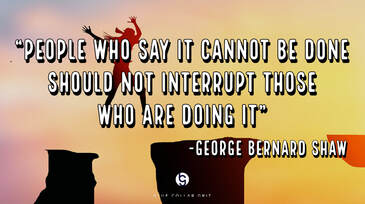Stealing InchesThe warm-up period prior to every varsity basketball game is twenty minutes. The approach to how the warm-up time is handled varies from program to program, but the majority of teams use it for just that, a warm-up.
They begin with some half speed passing drill leading into the infamous two line layups where players dribble in form halfcourt and shoot a layup, or whatever shot they want. The effort is typically minimal and serves as a time for players to ease into the intensity of the game. We don’t approach it like that. For us, the twenty minutes before the game are inches to steal. While most teams build little skill, one could actually argue they are building bad habits by performing the skills at a speed that will not take place in a game, we are basically holding practice for those fifteen minutes. Our reps are calculated and focused specifically on foundational aspects of our program and style of play. Our effort and intensity are high. We don’t lessen our effort because we are about to play a game. We don’t limit our focus because we are going to need more of it later. No. No. We do it at the level of our standard - all the time. That’s what stealing inches is all about. Why Should We Care? We play twenty-two regular season games. Twenty minutes for twenty-two games equates to just over seven hours. That’s seven hours of practice and reps that other teams are not getting. Over the course of a season we steal three to four practices simply from our pregame routine. The reps are important for the development of our players. The mindset is critical for the development of our people. The concept of stealing inches is attached to our core value of being passionate. People that are passionate, and really care about something, willingly choose extra work for what they are passionate about. The work is a by-product of the passion. So much so, that it no longer feels like work. It’s simply the only path to progress. And, progress is what passion longs for. By seeking progress we shine a light on the inches we can steal. They’ve always been there for the taking. We just don’t take them very often. It’s easier, and more accepted, to stay with the status quo. It’s different to warm-up at full speed. It's different to read between meetings. It’s different to write letters to your children each week. Those pursuing excellence are passionate. They’re always looking to steal inches. REAL TALK - Action Steps Stealing inches is sometimes difficult because it’s unusual. Most people don’t do it, so there isn’t a clear blueprint as to what to do or when to do it. Here are a few ideas that should help you get started.
The truth is that excellence isn’t an option without stealing inches. It’s not really an option. We have to do it. The good news is that once we taste the progress it provides, we will never want to stop looking for other inches to steal. For more information on building excellence in your teams, visit us at www.bluecollargrit.com. We would love to know how we could help!
1 Comment
Don't FlinchWe do not allow players in our basketball program to wear headbands, leg sleeves, or arm sleeves. I’ve been questioned on this a few times over the years, but the explanation to our players is always the same. Typically a player wants to wear one of these accessories because they like the way it looks and they subscribe to the mindset of ‘look good, play good’.
I do not subscribe to that mindset. My mindset is more of a ‘work and prepare as hard as you can, care about your teammates, and compete like crazy’ but that’s not as catchy. In any case, after some simple questioning the real purpose of the accessories is soon discovered - to look different from their teammates. One of the core values in our program, and for me personally, is being unified. For me, being unified goes beyond teamwork or merely working together. While those are certainly an aspect of being unified, they don’t quite reach the depth of commitment being unified requires. Unified means to “make or become united, uniform, or whole.” We want to be whole. Why Should We Care? I think you could say all leaders want their teams to be whole. We want our families to be whole, the teams we lead at work, even our social groups are best when they are whole. But, we have to work in order to get, and maintain, the quality of being unified. It certainly doesn’t just happen by chance, yet that’s exactly how most leaders go about creating a team. We put a bunch of people together, with different backgrounds, experiences, and perspectives on the world, and hope for the best. Then, when it doesn’t work, we’ll cite the individual struggles each person brought to the table and the gaps their talents left in our team. I’ve certainly fallen into this category from time to time with teams I’ve led. In reflection I can see the failure came down to my unwillingness to do one thing - speak up. I know what needs to be done in order for a team to be a team, I think we all do. But, knowing isn’t doing. We get what we allow in leadership, and that axiom certainly holds true when it comes to being unified. The behavior I attach to my core value of unified is speaking and acting with urgency. The speaking and acting parts of the behavior are critical, but it’s actually the urgency aspect that is the most important to me. My issue is rarely knowing what should be done or being able to actually do it, the issue for me saying or doing it now. Don’t flinch. REAL TALK - Action Steps Holding any standard is difficult, but this one is especially demanding because it is always being challenged. The individuals on our teams want to think about themselves. Heck, we want to think about ourselves. But, in order to be unified we must strike the perfect balance of considering the team as the priority while caring for ourselves enough to bring our best self to the group. Here are a few ideas on topics to be sure you aren’t flinching on when it comes to being unified.
Right is right and as leaders of a team, unified is right. Don’t flinch in holding that standard. For more information on building excellence in your teams, visit us at www.bluecollargrit.com. We would love to know how we could help! Think Big. Live Small.I started my teaching career at my alma mater, St. Paris Graham High School in rural southwest Ohio. Graham, named after 4-H founder AB Graham, was known for a few things, but we were most well known for our incredibly successful wrestling program.
Jeff Jordan, a legend in the wrestling world, was the head coach while I taught and coached at Graham. His teams won a state championship in every season he was the head coach. They also claimed a few national championships, which isn’t bad for a rural public school of about 700 students. After seven titles in a row and an eighth clearly on the way, I asked Coach Jordan how he kept the edge to maintain the level of wrestling year after year. It caught him off-guard. His first response was, “what do you mean?” Surely he knew they were the best. How do you improve on being the best? Jordan explained, “There are thirteen weight classes. I want us to have thirteen individual state champions. If we get thirteen state champions, then I want us to have thirteen pins in the state championship match. Winning the state is something that happens as a result of dominating. We want to dominate.” I wasn’t thinking big enough. Why Should We Care? Our dreams, or thinking, limit us more often than it elevates us. We are much quicker to point out, to ourselves and others, where we will likely fail rather than our potential success. We limit ourselves far more than others limit us. However, thinking big is only half of the puzzle. Along with that vision of thirteen state championships in thirteen weight classes, Coach Jordan’s teams worked. A lot … to the extent that seemed unreasonable to people outside of his program. The time, the effort, and the sacrifice were extreme. For those that shared the vision, it just became the norm or what was required. It became an investment rather than a sacrifice. And, most importantly Coach Jordan and his wrestlers ignored those that didn’t share the vision. They were not in the arena, so their opinion was obsolete. They trained as if they had never won a match, and like their next match was the most important one of the year. They practiced as if each takedown drill would perfect that one move that would seal the state championship. Details, execution, and repetition were the means. They thought big, but they lived small. REAL TALK - Action Steps Thinking big and living small is a challenging paradox. Big dreams often lead to a disregard for the basics and fundamentals. Yet, the basics and fundamentals only provide so much power when not coupled with the vision of our potential. Here are a few ideas to help with thinking big and living small.
We need to be sure to not limit ourselves with small thinking or big living. Thinking big and living small provides the narrow path to excellence. For more information on building excellence in your teams, visit us at www.bluecollargrit.com. We would love to know how we could help! Moments of TruthWe are slow to add things to our program and culture. I believe what you choose to add, or not add, is very indicative of the clarity of your culture. I clearly remember the days of sitting in coaching clinics, scribbling every word down, and mentally committing to changing pretty much everything we were doing.
The same was true with each book I would read. Everything was a good idea. Everything was better than what we were doing. But at some point I realized, while I was spending time being someone else, I wasn’t being myself. Rather than incorporating some ideas that would enhance what we were doing, I was constantly trying to change it all. That’s one of the clearest signs of a lost culture. Why Should We Care? As we gain clarity of what we value, our culture will solidify. Our core values serve as the foundation for that clarity and provide us with a distinct guide to what should, and what should not be, a part of our culture. Strong cultures know exactly who they are. They know when to say yes, but, more importantly, they know when to say no. Their moment of truth is pure. It never waivers. If an opportunity enhances their core values, they’re all in. If an opportunity compromises any aspect of their core values, they’re all out. Moment of Truth is a term we added to our program this season. Its addition has provided us with a great platform to discuss several topics in and out of basketball. A Moment of Truth, for us, is the instant of a decision. Particularly a decision in which you can choose a path of character or compromise. Character is what you should do, your job, your values, what would make you proud. Compromise is taking the easy path, cutting corners, giving a substandard effort, what you might regret. Honoring the Moment of Truth is always the goal. REAL TALK - Action Steps The application of the Moment of Truth is literally endless. In basketball, we apply it to running in transition, boxing out or rebounding, and screening for teammates. It seems we find a new way to apply it each week. Here are a few more general ideas for adding it to your culture.
Your Moment of Truth is something to be acutely aware of. Now that you’ve been introduced to it, you’ll begin to see, and feel it, when those times present themselves. Honor them with a choice that supports your values and the person you want to be. For more information on building excellence in your teams, visit us at www.bluecollargrit.com. We would love to know how we could help! |
About bcI'm a teacher, coach, and parent seeking excellence while defining success on my own terms. Archives
July 2024
Categories |





 RSS Feed
RSS Feed